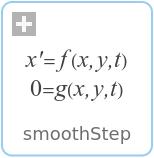WOLFRAM SYSTEM MODELER
smoothStepApproximation of a general step, such that the characteristic is continuous and differentiable |
|
Wolfram Language

SystemModel["Modelica.Media.Common.smoothStep"]

Information
This information is part of the Modelica Standard Library maintained by the Modelica Association.
This function is used to approximate the equation
y = if x > 0 then y1 else y2;
by a smooth characteristic, so that the expression is continuous and differentiable:
y = smooth(1, if x > x_small then y1 else
if x < -x_small then y2 else f(y1, y2));
In the region -x_small < x < x_small a 2nd order polynomial is used for a smooth transition from y1 to y2.
If mass fractions X[:] are approximated with this function then this can be performed for all nX mass fractions, instead of applying it for nX-1 mass fractions and computing the last one by the mass fraction constraint sum(X)=1. The reason is that the approximating function has the property that sum(X) = 1, provided sum(X_a) = sum(X_b) = 1 (and y1=X_a[i], y2=X_b[i]). This can be shown by evaluating the approximating function in the abs(x) < x_small region (otherwise X is either X_a or X_b):
X[1] = smoothStep(x, X_a[1] , X_b[1] , x_small); X[2] = smoothStep(x, X_a[2] , X_b[2] , x_small); ... X[nX] = smoothStep(x, X_a[nX], X_b[nX], x_small);
or
X[1] = c*(X_a[1] - X_b[1]) + (X_a[1] + X_b[1])/2 X[2] = c*(X_a[2] - X_b[2]) + (X_a[2] + X_b[2])/2; ... X[nX] = c*(X_a[nX] - X_b[nX]) + (X_a[nX] + X_b[nX])/2; c = (x/x_small)*((x/x_small)^2 - 3)/4
Summing all mass fractions together results in
sum(X) = c*(sum(X_a) - sum(X_b)) + (sum(X_a) + sum(X_b))/2
= c*(1 - 1) + (1 + 1)/2
= 1
Syntax
Inputs (4)
| x |
Type: Real Description: Abscissa value |
|---|---|
| y1 |
Type: Real Description: Ordinate value for x > 0 |
| y2 |
Type: Real Description: Ordinate value for x < 0 |
| x_small |
Default Value: 1e-5 Type: Real Description: Approximation of step for -x_small <= x <= x_small; x_small > 0 required |
Outputs (1)
| y |
Type: Real Description: Ordinate value to approximate y = if x > 0 then y1 else y2 |
|---|
Revisions
- April 29, 2008
by Martin Otter:
Designed and implemented. - August 12, 2008
by Michael Sielemann:
Minor modification to cover the limit casex_small -> 0without division by zero.
